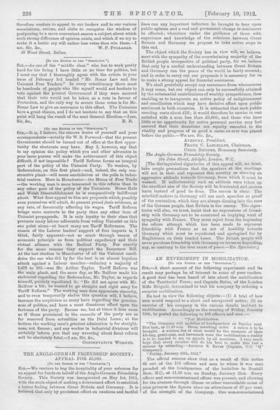ITO THII EDITOR or THE "SPECTATOR."' STEjIt is, I believe,
the sincere desire of yourself and your correspondents—notably Sir W. B. Forwood—that the present Government should be turned out of office at the first oppor- tunity the electorate may have. May I, however, say that in my opinion the policy which you and other advocates in your issue pursue will make the achievement of this object difficult, if not impossible P Tariff Reform forms an integral part of the policy of the Unionist Party. To weaken, by Referendum, on this first plank—and, indeed, the only con- structive plank—will mean annihilation at the polls in indus- trial centres. Here in Manchester—the Mecca of Free Trade —the working man is more interested in this reform than in any other part of the policy of the Unionists. Home Rule and Welsh Disestablishment he is comparatively indifferent about. What does appeal to him are proposals which, possibly even yourselves will admit, do present prima' facie evidence, at any rate, of favourably affecting his wages. Tariff Reform brings more converts to the party than any other item of Unionist propaganda. It is only loyalty to their class that prevents many labour adherents from voting Unionist on this one point alone—at heart many are Tariff Reformers. The reason of the Labour leaders' support of free imports is, I think, fairly apparent—not so much through reason of economic principle as from political expediency and their virtual alliance with the Radical Party. For exactly for the same reasons they support the Insurance Bill. At the last election in Manchester of all the Unionist candi- dates the one who did by far the best in an almost hopeless attack against a Labour member—reducing a majority of 1,478 to 205—was Mr. Arthur Taylor. Tariff Reform was the main plank, and the same day, as Mr. Balfour made his statement regarding the Referendum, Mr. Taylor, as regards himself, publicly repudiated it: " lie did not agree with Mr. Balfour a bit; he wanted to go straight and right away for Tariff Reform." The working man does appreciate sincerity, and to even temporarily shelve this question will, I believe, increase the scepticism so many have regarding the genuine- ness of polities, and have a most disastrous effect upon the fortunes of the party. Excuse me, but at times it does seem as if those prominent in the councils of the party are as far removed from actualities as the Dalai Lama ; at the bottom the working man's greatest admiration is for straight- ness, not finesse ; and any worker in industrial divisions will certainly inform you that any wavering about fiscal reform will be absolutely fatal.—I am, Sir, &c., CONSERVATIVE WORKER.










































 Previous page
Previous page